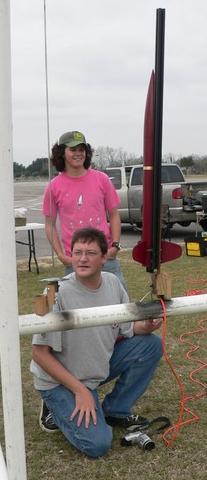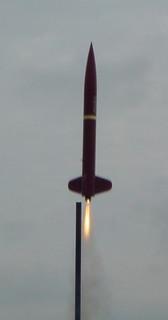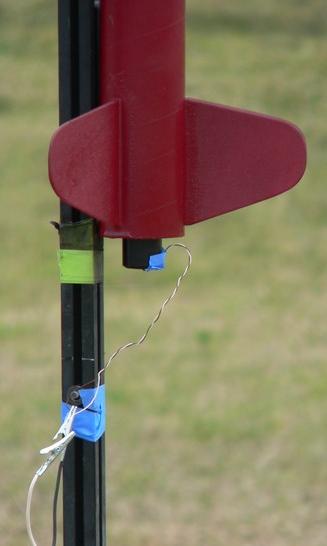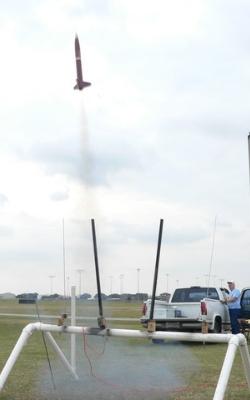DG&A High Power Rocketry Mini Sonik-Blast
DG&A High Power Rocketry - Mini Sonik-Blast {Kit}
Contributed by Greg Deeter
| Construction Rating: | starstarstarstarstar |
| Flight Rating: | starstarstarstarstar |
| Overall Rating: | starstarstarstarstar |
| Manufacturer: | DG&A High Power Rocketry |

Brief:
This is a 3 inch airframe version of the full sized (4 inch) Sonik-Blast offered by DG&A High Power Rocketry in Texas. It is a single stage rocket with a 29mm motor tube and the finished weight is considerably lighter than the full sized version. After being extremely pleased with the 4" Sonik-Blast and having flown it on everything from G to I motors, I decided to build this one specifically to fly at a field with an up to G motor and three pound weight limit and even more specifically to test some brand new Ellis Mountain long burn motors.
Construction:
I purchased everything to fly this rocket from vendors right here in the great state of Texas. The kit itself came from C.L.E. Enterprises, who delivered it to me at my home along with my order of Ellis Mountain motors (also made in Texas).
 The kit consists of all high quality components: LOC airframes, R.W.W. nose cone, superb quality aircraft plywood fins and rings, and a top notch recovery system. This is a rocket you can build without having to modify it as everything comes with excellent quality! The kit price is not only reasonable to begin with but to add to my glee I even got it on sale!
The kit consists of all high quality components: LOC airframes, R.W.W. nose cone, superb quality aircraft plywood fins and rings, and a top notch recovery system. This is a rocket you can build without having to modify it as everything comes with excellent quality! The kit price is not only reasonable to begin with but to add to my glee I even got it on sale!
This rocket was extremely simple to build. I airfoiled the fins leading and trailing edges with a belt sander which took all of about 10 minutes to do. The fin slots were quite simple to cut using a real X-Acto brand knife and new blade. By using 28 minute epoxy only, the entire build took about 2 hours and that was with me going slowly. It was fun to build and while I did not use the instructions, they are typical DG&A--top notch, easy to follow, and fully illustrated so anyone can build one of these real easy, even if you have never built a high powered rocket before.
Finishing:
This rocket was also quite easy and fun to finish. I mounted a broom handle onto a heavy base (cardboard box full of something) and stuck the rocket on the broom handle right up in its motor tube. 29mm motor tubes fit on broom handles perfectly for painting. I selected a different color and type of paint than I have ever used before: Rustoleum Paint for Plastic, which I found at Home Depot. It does not require primer and I choose a classy looking "Claret" or "Burgundy Wine" color. After using the whole can to coat the rocket 4-5 times it looked well, classy. The kit came with some very nice decals and I used the silver DG&A High Power Rocketry logo and the gold foil stripe. They were a cinch to apply and look great.
Construction Rating: 5 out of 5
 Flight:
Flight:
The first flight of this rocket was this morning at Paul D. Rushing Park in Katy, Texas with the Challenger 498 rocket club. The motor I selected was a new Ellis Mountain G20-7. The is a slow progressive 5.47 second burn G motor that was only available with a 3 second delay until very recently. The motor is so new that it is not even listed on Ellis Mountain's website yet. With this motor-to-weight ratio, a perfect flight is possible, yet wind came into play today. Right after the motors initial peak thrust, its power drops by about 40% for most of the duration of the flight. As winds today were between 15-20 mph, right after the rocket came off the ten foot rail nice and straight, wind caught the fins and it weathervaned something drastic for the entire duration of the burn. I would estimate that it never went over 400 feet, took a 5 second burn trajectory excursion right into the wind, and flew almost perfectly horizontal over one cow pasture then another until finally a violent landing during the tracking smoke phase. The rocket appears to have slowed down to under 100mph and stuck the entire nose cone in the ground, then ejected the airframe and chute perfectly. Much to my surprise there's not much damage other than cosmetic. The airframe was distorted very slightly but as you will see, I went on to fly it three more times after this very bizarre event.
 The second flight was about 30 minutes later this time on a new style Aerotech single use F50-6T Blue Thunder motor. The rocket demonstrated perfect stability this time, nice apogee ejection, and close recovery. For this flight I had switched out the recovery system and instead used a 30" Top Flight X chute purchased from Quickburst.net. Even though I was using a 600# Roscoe swivel the chute started to self reef for a progressively increasing descent rate. Landing was a little hard but it suffered no damage that was not already present from the first flight.
The second flight was about 30 minutes later this time on a new style Aerotech single use F50-6T Blue Thunder motor. The rocket demonstrated perfect stability this time, nice apogee ejection, and close recovery. For this flight I had switched out the recovery system and instead used a 30" Top Flight X chute purchased from Quickburst.net. Even though I was using a 600# Roscoe swivel the chute started to self reef for a progressively increasing descent rate. Landing was a little hard but it suffered no damage that was not already present from the first flight.
For the third flight I decided to revisit the Ellis Mountain long burn motors again (I love the things if you can't tell), and selected an Ellis G35-6 with an average of 15ns more oomph. Once again it weathervaned but not so bad this time. It was a nice flight with the 4 second burn. I am looking forward to a lower wind day to see how well it does on another Ellis G35. I used the stock 30" chute this time and the rocket touched down nice and soft, ready for more. Once of the club members even nicknamed the rocket "Jason" as it came back from what should have been death, just a little uglier.
For the fourth flight I used one of the motors that the kit actually recommends: the new redesigned Aerotech G80-6T Blue Thunder. This is a perfect motor for this rocket. The flight was straight up in 15-20 mph winds, it did not twist or spin at all and was picture perfect. It caught some higher altitude winds which resulted in a long walk, but that fast, loud boost and totally perfect apogee deployment were well worth the walk.
I am going to replace a section of the airframe that was buckled a little after the unusual recovery from the first flight but that is only to repair cosmetic damage. This rocket is strong as an ox and ready to fly again with or without revamping.
 Recovery:
Recovery:
The recovery system that came with the rocket is top notch and works perfectly. I replaced the eye bolts that came with the kit with my own stainless steel U-bolts.
I am going to rate this rocket on flights 2 and 4 only as these flights were perfect and they were on motors that the manufacturer recommends. I do not feel it would be fair to rate the rocket on flights using envelope pushing motors of my own choice.
Flight Rating: 5 out of 5
Summary:
DG&A Rocketry provides some very attractive, easy to build rocket kits that come out strong and are fun to try. They are rockets that you can trust to perform well and you can feel confident flying them. Considering that all of the components are of high caliber, I don't think you can even scratch build a rocket like them for less than the kit prices, as the prices are low and very competitive. I highly suggest DG&A rockets in fact I just ordered the Predator and am in the process of building a Defender. Thank you DG&A for some fine rockets!
Overall Rating: 5 out of 5
Other Reviews
- DG&A High Power Rocketry Mini Sonik-Blast By Chan Stevens
Small enough to fly on an LMR, rugged enough to get an L1, this versatile 29mm kit is a good introduction into higher powered rocketry. I won this little bad boy in EMRR's Mach 1-2-3 virtual contest. About two weeks later, the box arrived, complete with a kit label on the outside. The parts were carefully packed, individually wrapped, and very good quality. Parts list includes: ...
- DG&A High Power Rocketry Mini Sonik-Blast By Jeff Short
( Contributed - by Jeff Short - 04/01/04) Brief: This is a great entry level MPR/HPR 3FNC rocket that flies on a great range of G and H motors. Modifications: I upsized the motor mount to 38mm from the 29mm that the kit comes with. I just replaced the two 3" x 29mm centering rings with three 3" x 38mm centering rings. I also added a 3rd centering ring. In retrospect, ...
 |
 |